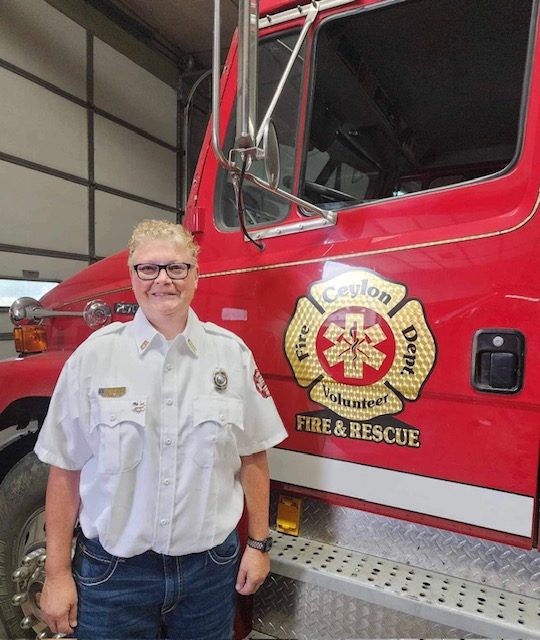It was 22 years ago when Ellen Kling decided to join the fire department in Ceylon. Her husband Larry had been active at the department since high school, and she was drawn to the comradery she had seen in the fire service.
“You don’t have to like each other, but yet when you get to a fire, you have each other’s backs,” said Ellen.
When Ellen isn’t volunteering as a training officer and EMT, she manages an excavating and scrap iron business with her husband.
With retirement on the horizon, Ellen was startled to find out she had a spot on her lung. After reviewing her shoulder X-ray results in her online portal back in December 2022, Ellen messaged her provider for further review. After several scans and tests, she found out it was cancerous.
Most lung cancers do not cause any symptoms until they have spread, so Ellen was lucky to catch it early. Ellen’s experience isn’t uncommon – after all, firefighters have a 9% higher risk of being diagnosed with cancer and a 14% higher risk of dying from cancer than the general U.S. population, according to research by the CDC and National Institute for Occupational Health and Safety (NIOSH). But her story is a perfect reminder of the importance of advocating for yourself as a patient.
In March 2023, Ellen underwent surgery at Mayo Clinic in Rochester to remove the cancerous lung nodules. Fortunately, she is now cancer free and is following up with testing and appointments every six months.
As a training officer for Ceylon Fire, Ellen was already aware of MnFIRE and the Hometown Heroes Assistance Program (HHAP) resources when she was diagnosed with lung cancer. She’s the one who coordinated the MnFIRE trainings for her department and even learned about the increased cancer risks facing firefighters. But after her diagnosis, her thoughts weren’t on any programs MnFIRE had. She wasn’t thinking about anything but the next appointment – as is typical when facing a serious illness.
“Until you have cancer or any disease, you don’t really understand the mentality and the things that go through your head – the tunnel vision that you get,” said Ellen.
Luckily, Ellen’s friend and Dunnell Fire Chief, Al Helmers, reached out to remind Ellen about the free Critical Illness benefit available to her through Hometown Heroes.
“Having that support system, that’s one of the things about the fire service that I like,” said Ellen. “There’s always that firefighter next to you to say, ‘hey, have you checked on this or are you doing ok?’”
“To be honest, I wasn’t worried about the financial. I was thinking straightforward. Am I going to die? How bad is this? Having someone there to say, ‘hey, you know there is a program that is going to take some financial burden off and you’re going to need that’ – that’s great.”
Ellen filed her claim but was skeptical about getting the full $20,000 benefit advertised by MnFIRE. That thought was quickly dashed, and she was excited to discover the critical illness policy provider, Securian Financial, sent a check for the entire amount.
It’s certainly not cheap to have cancer. Ellen was off work for six weeks – a significant amount of time especially when you own your own business. Her treatment also required several stays in Rochester, and she has had to make several trips to Mankato and Fairmont for testing and appointments. Like so many firefighters in Minnesota, Ellen lives in a rural area and sometimes it can be quite the hike to access healthcare services.
“As my husband and I are self-employed,” said Ellen, “the money I received allowed me to have some peace of mind knowing I could spend time healing after surgery and not have to stress about money or rushing back to work too soon.”
Although she’s still in recovery, Ellen’s grateful that her treatment has been effective, and she was able to receive this extra financial support through it all.
“It’s a great program,” said Ellen. “Especially because the majority of firefighters in the state of Minnesota fall under the volunteer status and don’t necessarily have access to career benefits.”
Knowledge is power
When firefighters head out on a call – they’re thinking about putting the fire out. MnFIRE has made great strides so far in creating awareness for the high incidences of heart attacks and cancer facing the fire service, but even more can be done.
“Prior to the MnFIRE training, we didn’t have a gear washer,” said Ellen. “We just kept wearing our turnouts … so the training is valuable to any firefighter.”
Ellen believes MnFIRE trainings have been powerful during her time as a firefighter – and even lifesaving in the long run. Learning about the increased health risks firefighters face and how best to protect yourself can make a huge difference, like making sure you’re putting your hood on, getting a good seal and decontaminating gear as soon as possible.
“The small things, those definitely add up,” said Ellen. “I think MnFIRE has been great in helping firefighters become healthier and make good choices.”
It’s so important to check in on each other often and spread the word about the resources available to all of us firefighters. Knowledge is power – with both cancer prevention and care.
Critical Illness Program details
As part of the Hometown Heroes Assistance Program, all Minnesota firefighters are automatically enrolled in a statewide Critical Illness insurance policy which covers diagnoses of cancer, cardiac or other critical illnesses, and provides a lump-sum cash payment up to $20,000 to assist with expenses like medical bills and travel costs to and from specialist visits. Qualified claims for diagnosed illnesses from August 1, 2021, and on are eligible. The firefighter has one year from the date of diagnosis to file the claim. For more information or to file a claim, call 888-784-6634 or visit securian.com/mnfire-insurance.








